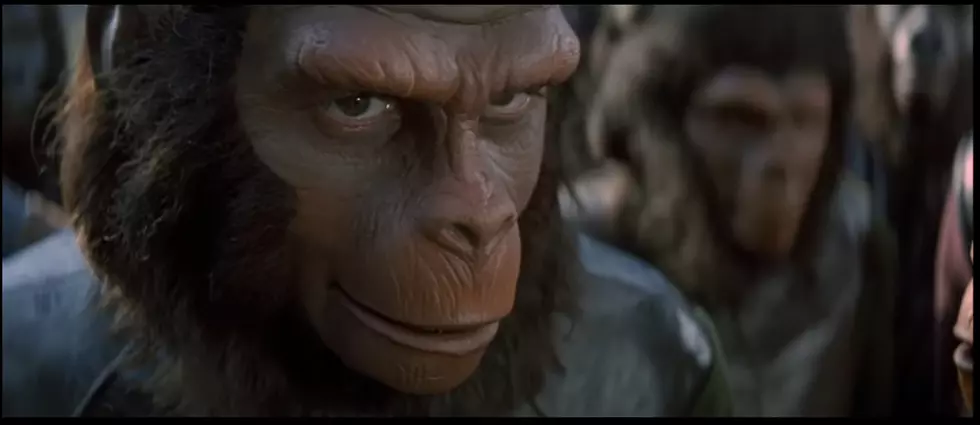
Did You Know the Planet of the Apes Franchise has a Shreveport Connection?
"Take your stinking paws off of me, you damned dirty ape!" That single line, uttered by Charlton Heston, has been described as one of the most iconic lines in cinematic history. The original 5 film Planet of the Apes series began in 1968 with the first film titled simply, Planet of the Apes.
Series Origin
The first movie was based on the 1963 french novel, La Planète des Singes, by Pierre Boulle. It was, of course, translated into English, under the title Planet of the Apes. The book was adapted to film in 1968, and the success of that first film, which included the iconic "stinking paws" line, led to 4 more films in the original series, including:
Beneath the Planet of the Apes, (1970)
Escape from the Planet of the Apes, (1971)
Conquest of the Planet of the Apes, (1972)
and Battle for the Planet of the Apes, (1973)
But it's also led to a 56 year long (and counting) franchise. Pierre Boulle would would be absolutely apestatic. And even though Roddy McDowell was already a prolific actor, having been a child-star since 1938, and had appeared in hits like How Green Was My Valley, and Cleopatra with Elizabeth Taylor, it was Planet of the Apes that launched McDowell into the consciousness of the American movie-goer, and ultimately, to legendary status to Apes fans around the world. He would make a killing at Cons today.
Continuing the Franchise
The films also inspired a television series in 1974, and an animated series, Return to the Planet of the Apes, in 1975. Then came a remake in 2001 by director Tim Burton. The series rebooted in 2011 with Rise of the Planet of the Apes, Dawn of the Planet of the Apes (2014), and War for the Planet of the Apes (2017). And now there has been a new film announced called Kingdom of the Planet of the Apes, which is expected to be released in 2024. That's 56 years after the original Planet of the Apes films' debut.
Of course, the series generated a plethora of toys and merchandise tie-ins. In fact, Fox licensed around 60 different companies to produce a multitude of Ape products, including everything from action figures, masks and costumes, and lunch boxes, to trading cards, toy weapons, coloring books, apparel, and Ape branded tableware.
Shreveport Connection
But let's go back to the original franchise. And let's face it, even with all of today's amazing film-making technology, with it's incredible CG effects, and 21st century movie making capabilities, there's really nothing like those first Planet of the Apes movies. Even with their now cheesy looking sets, and limited special-effects technology available in 1968, you just can't match the magic that those first films had. With those prosthetic ape masks and make-up, and really weird musical score, those films were truly ground-breaking for their day. Planet of the Apes was nominated for two Academy Awards, including Costume Design and Original Score.
The fifth and final film of the original franchise was green-lighted by Fox with director J. Lee Thompson returning, story by Paul Dehn, who'd worked on previous Ape films, and screenplay written by Shreveport's John William Corrington. Corrington, known as Bill to his family and friends, was a Byrd High and Centenary College graduate. He was a novelist, a poet, a lawyer, a professor at LSU, and an American film & television writer.
If you look up Corrington's IMDB page, he amassed quite an impressive list of credits. He and his wife, Joyce Hooper Corrington, wrote or co-wrote several films and TV shows, including The Omega Man, (1971) (also starring Charlton Heston), the aforementioned Battle for the Planet of the Apes, (1973) while he was still a law student, and I am Legend, (2007, from a 1971 screenplay).
His television credits, along with his wife Joyce, include General Hospital, One Life to Live, Another World, Capitol, Search for Tomorrow, and Texas.
After his death, Corrington's novella, Decoration Day, was adapted as a Hallmark Hall of Fame television special in 1990 that was nominated for an Emmy, and won a Golden Globe Award. He passed away on Thanksgiving Day, November 24th, 1988 after suffering a heart attack at the age of 56. Bill sounds like an incredibly interesting man. I wish I would've had the chance to meet him.
Louisiana Born Actors Who Have Appeared In Horror Films
Shreveport-Made Halloween Movies For People That Don't Like Horror
19 Scary Movies With Louisiana As The Setting
More From News Radio 710 KEEL









